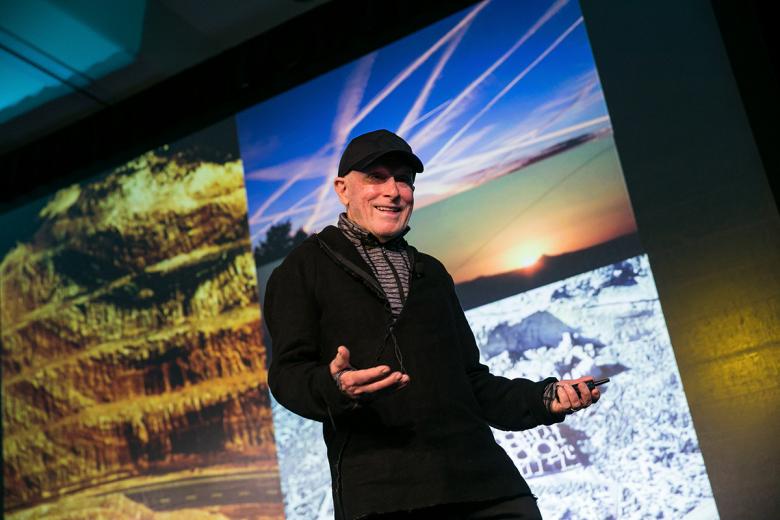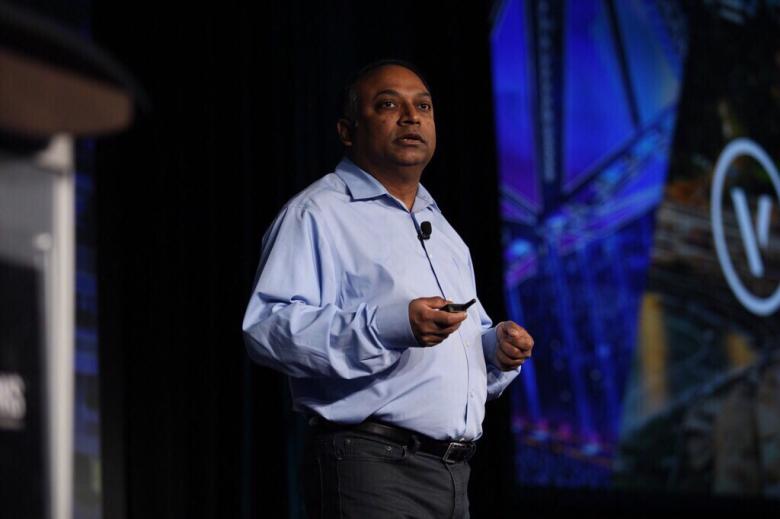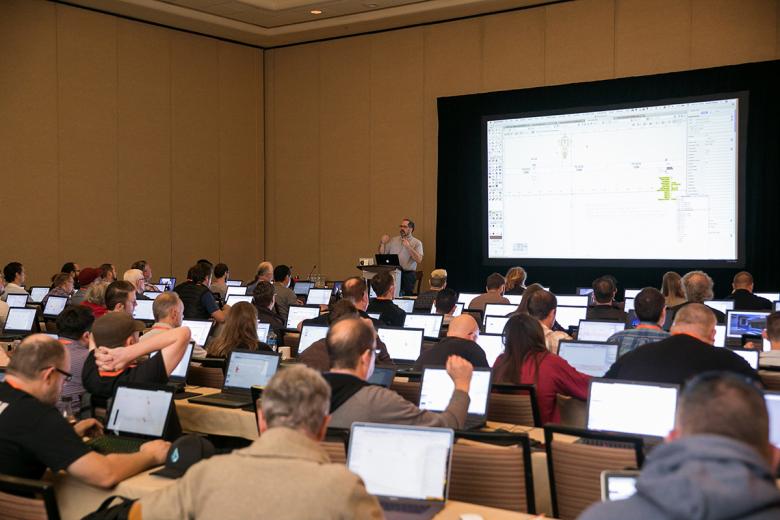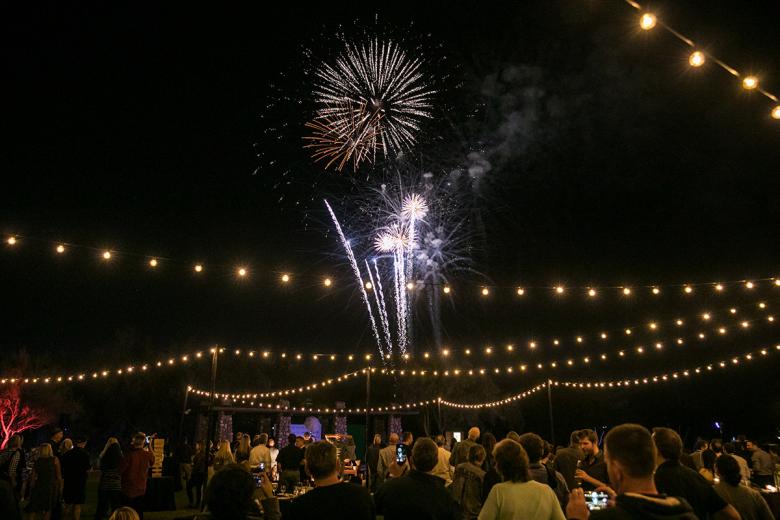27. 11月 2018
Antoine Predock during his keynote address (Photo: Jason Dixson Photography)
Six hundred architects, interior designers, landscape architects, and entertainment designers from 18 countries flocked to sunny Phoenix, Arizona, in early November for the 2018 Vectorworks Design Summit. The three-day event was packed with training sessions, presentations, networking opportunities, information on the new release of Vectorworks software, and a keynote by architect Antoine Predock. World-Architects was in attendance.
By the time Predock took the stage to speak to the full house in the “Komatke” hall of the Sheraton Grand at Wild Pass resort, the Summit was more than half over. His keynote came the morning after the rollicking Customer Appreciation Party, with its scrumptious barbecue, free-flowing local beers, and impressive fireworks show. But Predock — a youthful, motorcycle-riding 82 — energized the crowd with stories about his long and prolific career, insights into how he understands the places where he builds, peeks into his distinctive design process (sketches, collages, and lots of clay), and presentations of a handful of recent projects, most well outside his adopted home of New Mexico. The joy, honesty, humor, and deep humanity of Predock came across strongly in his one-hour talk: “Site Specificity and the Aura of Globalization.” Most relevant to the Summit is the fact the architects at Antoine Predock Architect PC in Albuquerque are Vectorworks users.
Watch Antoine Predock's keynote address:
In the tail end of Predock’s keynote, colleague Paul Fehlau stood up from the audience (at the 57-minute spot in the video above) to reveal the circumstances by which the studio chose Vectorworks over other CAD software available at the time. The project was the Spencer Theater for the Performing Arts (1994-98), a wedge-shaped limestone building rising from a New Mexico mesa. A Stealth-like glass appendage that serves as the building's main entrance created an impasse in translating Predock's physical models into digital data. Having used a few different pieces of CAD software as needed since the 1980s, Fehlau — a 25-year-plus Vectorworks user — realized that only one of them could precisely locate the complex intersecting geometries as coordinates in space: MiniCAD, the precursor to Vectorworks. Although Predock is a celebrity in and beyond the desert Southwest, he is not an exception in regards to appreciating the software; I heard other instances during the Summit of how certain Vectorworks features led firms to adopt the software. Consistent improvements and the company’s openness and responsiveness to user needs ensure these firms stick with Vectorworks.
Vectorworks CEO Biplab Sarkar during the keynote address (Photo: Jason Dixson Photography)
New developments in Vectorworks’ 2019 suite of software were presented the morning before Predock’s talk by Vectorworks CEO Biplab Sarkar and fellow members of the Vectorworks team. As in previous years (World-Architects has been a Summit media partner since 2016), Sarkar began his keynote by outlining the company’s growth, both in revenue and number of users, and illustrating the distribution of Vectorworks users, both geographically and in terms of industries (primarily AEC, landscape, and entertainment). Even though the AEC industry makes up just over half of all Vectorworks users, official Summit stats put about half of attendees in the entertainment sector, one-third in architecture, and the rest in landscape and interiors. (These facts were apparent during the Summit, with a prevalence of attendees wearing orange, entertainment lanyards; architects and interior designers wore blue, while landscapers wore green.) The large entertainment turnout was due in large part to Vectorworks Spotlight being a software standard in the entertainment industry. While Vectorworks Architect may not be such a standard, it was clear that users in attendance are strong advocates for the usability of Vectorworks software and highly appreciative of the advances in the Vectorworks 2019 release unveiled two months ago and discussed in the keynote.
Watch Vectorworks CEO Biplab Sarkar's keynote address:
Like last year, advances in Vectorworks 2019 software have focused on quality and performance, analyzing the workflows and usage patterns of users in order to increase their productivity. During the keynote, Sarkar and his team members outlined some of the advances, with the Data Tag tool and 2D components for hybrid objects capability, both in the 2019 release of Architect, and the Dark Mode, an enhancement planned for a future release of all Vectorworks software, being particularly well received. But more useful for attendees were the "Ask the Engineers" stations outside of Komatke hall, where users could talk to Vectorworks developers about new features and then see them in action. These stations convey one aspect of Vectorworks that users appreciate: the ability to interact with developers, give feedback on features, and potentially influence future updates. Every architect I spoke with at the Summit echoed the openness and responsiveness of the Vectorworks team in this regard.
One of the numerous training sessions during the Summit (Photo: Jason Dixson Photography)
Architects I met also spoke highly of the training sessions. The Summit consisted of 54 sessions, some of them structured as presentations to illustrate the different ways users interact with the software (Oslo's GASA Architects, for instance, touched upon their efforts to minimize every aspect of their BIM models in Vectorworks Architect, from toolbars and layers, to the numbers and sizes of files), and some set up for training. Over 90 hours of the latter were available, ranging from a demonstration of how to extract drawings from a 3D model to a workshop on Marionette, Vectorworks' parametric design tool. A supply of laptops and digital files allowed users to follow along with the instructor — learning by doing at the Summit.
Fireworks during the Customer Appreciation Party (Photo: Jason Dixson Photography)
In the coming months World-Architects will focus on some of the architects we met at the 2018 Vectorworks Design Summit, highlighting their work and the ways they use Vectorworks in their practices.
World-Architects is an Exclusive Media Partner for the fourth annual Vectorworks Design Summit, which took place November 4-6, 2018, in Phoenix, Arizona.
関連した記事
-
Smart, Sustainable Vectorworks
on 2019/03/11
-
Building Efficiency at Flansburgh Architects
on 2019/01/23
-
Learning at the Summit
on 2018/11/27
-
Vectorworks 2019 Released
on 2018/09/12



